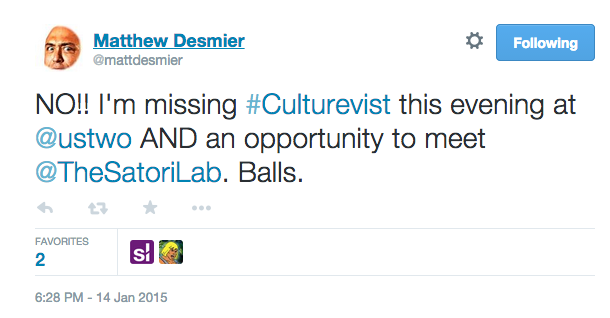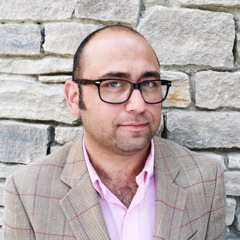I’m not sure when Matt (@mattdesmier) gets a chance to sleep, let alone answer interview questions – he is director at Wise Old Uncle and Think Create Do based in Poole and also founded Silicon Beach – which started as an annual event gathering together the cream of the UK’s digital and creative sector in Bournemouth to share their expertise and latest innovative thinking. It then grew into a repository and has since morphed into a consultancy.
Matt Desmier is the first hacker in our series I’ve never met yet. It almost happened (our first real life meeting), this week, close but no cigar… If it had happened, it would have been at the Culturevist meetup organised by Matthew Partovi, which kind of makes sense as I became aware of Matt (Desmier) through Matt’s (Partovi) recommendation. I got super excited when I saw his avatar appear on the event twitter wall, and then I got close enough to read it…
Before we hand over, you should probably also be aware that Matt has a playful and sexy side. Anyway, over to Matt…
What do you do for a living?
I constantly struggle to answer this question, indeed to the outside world it probably looks as if I’ve worked very hard to become virtually unemployable! In such circumstances John Willshire (@willsh) once said that the best way to describe your work was to talk about the last thing you did, the thing you’re currently doing and what you’re planning on doing next. So…
The last thing I did…
I recently completed a 6 month consultancy project with Bournemouth Borough Council helping them implement elements of their Digital Challenge Strategy (although if truth be known, I’ve put too many irons in the fire and am enjoying this way too much to stop now).
The thing I’m currently doing…
I’ve just taken on two new creative agency clients, to be their mentor, swelling the stable I’m supporting to five. I’m working closely, in a very hands-on way, with each of them on growth strategies. They’re all very different and require different support – but that’s what keeps it interesting!
The thing I plan on doing next…
Earlier this year I launched a not-for-profit social enterprise, ThinkCreateDo – a web-based platform built to grow and support the digital economy of the South Coast of England. The MVP has been live for 6+ months and has proven that the idea can work. I now need to move onto v2.0 and make it self-sustaining and I’m currently piecing together a plan to make that a reality.
What ding are you trying to make in the universe?
I used to enjoy a drink or two (or three or four!) with this chap, my friends Dad, who was fond of saying to me “Yes, but what is your significance Matt?” and I always struggled with an answer. I’m still struggling to think of an answer. In a metaphysical sense I’d like to think that something I’ve done or enabled has, or will have, opened someones eyes and enabled them to do something truly awesome. In a more physical sense, I hope I don’t make any kind of ding in the universe and I leave it in a better shape than the one I entered it in.
What is your life mantra
If it’s funny, do it. That’s been my life mantra for the past 20 years, so much so even my wife has now adopted it. More recently though I’ve found myself working to another, almost complementary mantra:
What’s the worst that can happen? [ed: did we mention he is playful and sexy? Yes dear reader, click the link]
Nikolai Tesla or Thomas Edison?
Edison. Tesla’s cool and all that, but Edison is the father of both the movies and the recording industry. My world would be a pretty dull place had Edison not been around…
Favourite place in the world? and why?
I have two. Twitter has almost become a place in the world I love to visit – in fact anyone who follows me will almost think I live there! I discover so much on Twitter, simply by what other people are discovering and sharing that it’s become almost indispensable to me.
In the real world however, I live by five miles of the most exquisite beach that the UK has to offer and a simple walk along it can really clear the mind. It’s almost meditative. I don’t go there often, but when I do I’m reminded that no matter what I discover on Twitter, nothing can beat the inspiration nature throws at us daily.
Who is your hero? and why?
Nick Cave. I can remember discovering him when I was about 17, via the Henry’s Dream album, and suddenly being transported to another world. He appears to have this single-minded approach to his art – and it truly is art – that exists regardless of the medium to which he applies it, be that music, soundtracks, books or films. And that unwavering focus means that everything he does is imbued with the same level of quality.
Who is the most interesting hacker you have come across? and why?
Syd Lawrence (@sydlawrence). Syd is an amazing guy, a genuinely nice bloke full of boundless energy, who just hacks – in the coding sense of the phrase – for a living. Along with the clever team he works with at We Make Awesome Sh, they’ve turned this thing they do for fun into a pretty impressive job. They’ve opened my eyes wider than anyone else.
How would you define ‘hacker’ using only words allowed by upgoer5? http://splasho.com/upgoer5/
Someone who, without fear of getting it wrong (for this is where true learning lies), approaches a problem, and answers it in as quickly and as simply a way as possible.
What is the coolest hack you have seen?
Based on the definition I’ve just given and what I know of the project, I’d say www.gov.uk. Having worked in or with the public sector for the majority of my career, this entire project is at odds with everything the public sector holds dear, yet shows that working in an agile, hack-like manner pays dividends.
What is the biggest obstacles for hackers in traditional organisations?
Hierarchies and bureaucracy. Traditional organisations are impervious to change. They aren’t built to work quickly or in agile ways and they’re predominately risk averse. Because of these structures, the embedded processes and the “this is how we’ve always done it” mindset, invariably the people who work within these organisations aren’t given the time, space or support needed to hack anything.
What is the value of having hackers in your organisation?
Perspective. Or at least a different perspective and one that encourages change. Without it, organisations are doomed.
If you enjoyed hearing from Matt, check out our other Good Hacker interviews:
The Good Hacker Part 1 – James Arthur Cattell
The Good Hacker Part 2 – Matthew Partovi
The Good Hacker Part 3 – Matt Jukes
Based on our survey, 75% of hackers are called Matthew!


